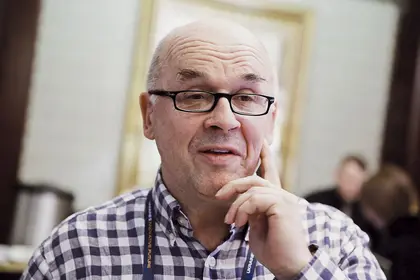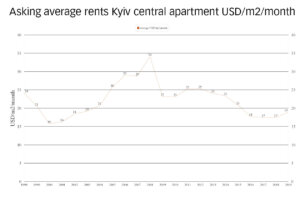Foreigners who came to Ukraine in the heady days right after independence tended to fall into two camps: Those who succeeded and stayed, and those who failed and left.
Phil Hudson, owner of Jones East 8, is definitely one of the success stories as a pioneer of Western investment in Eastern European real estate.
He came to the region just before the 1991 collapse of the Soviet Union, and started publishing a monthly supplement about real estate in Central and Eastern Europe. He decided to settle in Kyiv in 1992 when the European Bank for Reconstruction and Development commissioned a major study from him on Ukraine’s nascent post-Soviet real estate sector. Before that, the United Kingdom citizen worked seven years for an architectural firm in London.
And the rest, as they say, is history.
His early formula for success in Ukraine? Gain knowledge, then contacts and then clients.
He has also shown a willingness to go to court to settle disputes. For instance, he recently lost before the Ukrainian Supreme Court in a lawsuit he filed against Roshen, the confectionery owned by President Petro Poroshenko, for failing to pay for design work he did on a milk-processing plant in Vinnytsia, a provincial capital of 370,000 residents located 270 kilometers southeast of Kyiv. Roshen successfully argued before the court that they didn’t owe Hudson anything, contending that Hudson’s designs were unusable and delayed. He is considering an appeal to the European Court of Human Rights, alleging that the Supreme Court ruling undermines the sanctity of contracts.
In the early years, when he was short on capital, he’d take an ownership stake in a property in lieu of consultancy or design fees, a form of “sweat equity,” as he puts it. He also said that he got ahead because his investments have been cautious, his debts low and his entanglements in joint ventures few
“We haven’t had any disasters,” Hudson said. “My disappointments are working for somebody else and not getting paid. I’m my own boss.”
He’s an architect by profession. But he and his wife, Lada, run the small (close to 20 employees, down from 50 at peak) Jones East 8 agency. It’s a full-service one that designs, develops and manages construction and properties. They also serve as agents in finding offices or apartments for purchase or rent. He has also done valuations.
His roster of projects has included Raiffeisen-Bank Aval, Billa supermarket, Radisson hotel, Roshen, Forman factory, and the Rijk Zwaan agricultural firm. During the 2012 Summer Olympics in London, he also designed a conference center, restaurant and shop 200 meters from the main stadium. Recently, he’s helped find office space for the likes of the World Health Organization and Procter & Gamble.
Today, he owns 10 apartments, mainly on Ivana Franka Street, and one office building near the National Circus in central Kyiv, with rental income providing most of his company’s revenue today.
“That’s our bread and butter,” Hudson said.
Enormous changes
Ukraine’s real estate sector has improved significantly compared to the wild early days of the 1990s, said Hudson, who can regale listeners with tales of murder, illegal construction, dueling security guards and official corruption from that era.
What’s changed since then? It’s more civilized, he said. Government permissions are easier to get now. Building standards are higher. A landmark 1996 law allows for apartment buildings to become legal condominiums where the residents exert control.
Although the downsides of the sector are well-known — lack of affordable financing, lack of rule of law, lack of competition in the construction industry — Hudson said that the advantages are too often underestimated.
“One of the most spectacularly successful privatizations was residential real estate. It’s unsung,” Hudson said. “It created capital on a family scale.”
People became owners of the state-owned places where they were living in Soviet times, and many took advantage of these new market conditions to make money or improve their living conditions.
Additionally, he said, the lack of affordable bank financing has kept housing prices low — still half of their pre‑2008 peak before the global financial crisis hit with full force.
“Historically, this could be a great time to buy now,” he said.
“It’s full of risks, of course. But on the face of it, if you look at the other sectors, look historically, these (low prices have) been bumbling along at this level for 10 years.”
Also, he believes there is an oversupply of apartments, with 70,000 available by estimates that he has seen, creating a buyer’s market.
Property taxes and other fees are also low, he said, providing yet more advantages.
When buying, Hudson said people should strongly consider newer buildings with strong building management. Buying an older apartment may be cheaper, he said, but it often puts the owner at the mercy of the character of the other tenants.
Ethics, rule of law matter
On the minus side of the ledger, Hudson said that “in this county there is not the clear sense that something is right and wrong.” He said Americans and British “have developed all sorts of sophisticated codes of behavior in consultancy…that are quite difficult for Ukrainians to grasp.”
He said “peer pressure” to do the right thing is an underestimated virtue that he finds still lacking in Ukraine despite what he calls an abundance of talented professionals. “In the U.K., if you’re caught misbehaving or cheating in some way, then you have problems.”
And this lack of morality extends on a national basis to the lack of rule of law, another deterrent for the real estate sector.
“Because he’s not addressing rule of law, money will not be piling in here as it could,” Hudson said of President Petro Poroshenko, who is seeking re-election on March 31.
While he’s more focused on British politics, he has taken notice of presidential candidate Volodymr Zelenskiy, the front-running comic actor.
“Zelenskiy is interesting. People say he lacks experience. The lack of experience I would regard as a positive thing. Experience in what? This awfully corrupt sort of system? Even if the guy makes mistakes, if he is breaking the oligarchy system, that’s got to be a positive. If the international community sees a genuine attack on corruption and the assertion of law, this place could take off.”
And that would work just fine for Jones East 8 and the Hudsons, Phil and Lada.
“If you get rule of law, interest rates will drop, there will be more money to invest and buy, and the market will rip.”
As for the future of Jones East 8, ”we are in a position to be more selective in the work,” Hudson said. “It would be nice to get back to the large projects I was involved with in the United Kingdom over a quarter of a century ago. After all, if we have managed to prosper despite two revolutions and a war, we must be doing something right.”
You can also highlight the text and press Ctrl + Enter





